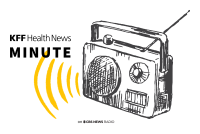Latest KFF Health News Stories
Journalists Describe Drivers of High Health Costs and Spell Out the Science of Protein
KFF Health News journalists made the rounds on national and local media recently to discuss topical stories. Here’s a collection of their appearances.
Newsom Tries To Thread Needle on Immigrant Health as Ambitions Turn National
Get our weekly newsletter, The Week in Brief, featuring a roundup of our original coverage, Fridays at 2 p.m. ET.
Ponerlos al tanto de estos riesgos podría disuadirlos de inscribirse en el Medicaid de Emergencia, que ofrece atención médica de urgencias a inmigrantes que no califican para la cobertura regular de Medicaid.
With ICE Using Medicaid Data, Hospitals and States Are in a Bind Over Warning Immigrant Patients
The Trump administration’s move to give deportation officials access to Medicaid data is forcing hospitals and states to consider alerting immigrant patients that information from emergency medical coverage applications could be used in efforts to remove them from the country.
Effective but Underprescribed: HIV Prevention Meds Aren’t Reaching Enough People
PrEP has been available for more than a decade, but billing mistakes, lack of awareness, and lingering stigma keep many people from getting the lifesaving HIV prevention medication.
What the Health? From KFF Health News: HHS Gets Funding, But How Will Trump Spend It?
Congress has passed — and President Trump has signed — the annual spending bill for the Department of Health and Human Services. But it’s unclear whether the administration will spend the money as Congress directed. Anna Edney of Bloomberg News, Joanne Kenen of the Johns Hopkins Bloomberg School of Public Health and Politico Magazine, and Sandhya Raman of CQ Roll Call join KFF Health News’ Julie Rovner to discuss that story and more. Also this week, Rovner interviews KFF Health News’ Renuka Rayasam about a new reporting project, “Priced Out.”
Newsom propuso que el estado no intervenga cuando, a partir de octubre, el gobierno federal deje de brindar cobertura médica a unos 200.000 residentes legales, entre ellos solicitantes de asilo y refugiados.
Newsom Walks Thin Line on Immigrant Health as He Eyes Presidential Bid
Progressives are assailing Gov. Gavin Newsom for proposing to pull back coverage for some legal residents, such as refugees and asylum-seekers, while conservatives lambaste the California Democrat for using limited state funds on Medicaid coverage for immigrants without legal status.
Poison at Play: Unsafe Levels of Lead Found in Half of New Orleans Playgrounds
Verite News’ reporters tested soil in more than 80 playgrounds for lead contamination. Even in trace amounts, lead exposure in children can result in lower IQs, learning challenges, and behavioral issues.
Listen: Many Tents Are Gone, but Washington’s Homeless — And Their Health Problems — Aren’t
Sweeps of encampments scatter homeless people, as medications are tossed and street medicine providers scramble to reconnect with their patients. KFF Health News senior correspondent Angela Hart discusses the aftermath on the Jan. 28 edition of WAMU’s “Health Hub.”
When the Doctor Needs a Checkup
The physician workforce is aging fast, and some hospitals now require that older clinicians undergo testing for cognitive decline. Many have resisted.
Listen to the Latest ‘KFF Health News Minute’
The “KFF Health News Minute” brings original health care and health policy reporting from our newsroom to the airwaves each week.
If You’re Pregnant and Uninsured, Medicaid Might Be Your Answer
Prenatal care can make a huge difference to the long-term health of both the parent and baby. Every state offers health coverage to lower-income pregnant women who might otherwise go uninsured.
NIH Grant Disruptions Slow Down Breast Cancer Research
The Trump administration has made the future of federal funding for cancer research uncertain. At one groundbreaking breast cancer research lab, work that could save lives has slowed significantly.
Si estás embarazada y no tienes seguro de salud, Medicaid podría ser la solución
Todos los estados ofrecen cobertura de Medicaid a las mujeres embarazadas que cumplen con ciertos requisitos de ingresos. Pero cambia dependiendo del estado.
When Health Insurance Costs More Than the Mortgage
As health care costs skyrocket and federal lawmakers pull back help on insurance premiums, more middle-income families are facing tough choices on health care.
It’s 2026 and You’re Uninsured. Now What?
Many Americans are expected to lose ACA or Medicaid coverage in coming months and years as a result of the One Big Beautiful Bill Act and the expiration of enhanced pandemic-era subsidies that helped people afford Obamacare plans. Doctors and researchers say there are still ways to find affordable care.
Your Next Primary Care Doctor Could Be Online Only, Accessed Through an AI Tool
The largest hospital chain in Massachusetts is offering a new AI-assisted telehealth tool to patients who need primary care. Mass General Brigham says this and other AI tools can help relieve staff burnout and worker shortages, but some primary care physicians in the MGB system see it as a way to avoid fixing structural problems.
Cuando el seguro médico cuesta más que la hipoteca
A pesar de las intensas discusiones y del cierre del gobierno más largo en la historia, el Congreso permitió que los subsidios mejorados de ACA expiraran el pasado 31 de diciembre.
Es 2026 y no tienes seguro médico. ¿Y ahora qué?
Los cambios en las políticas de salud en Washington están teniendo repercusiones en todo el país y haciendo que millones de personas pierdan su cobertura de Medicaid o de ACA. Pero hay opciones.


















